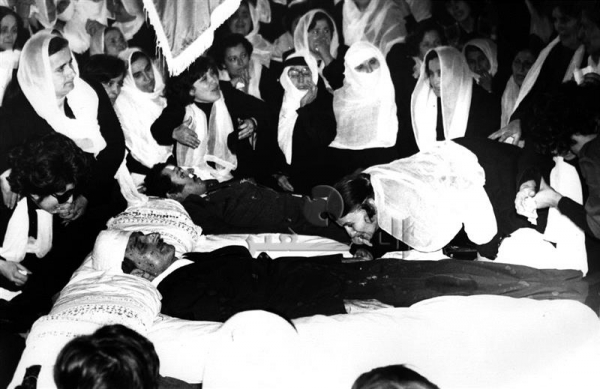March - Assassination of Kamal Jumblat on March 16, 1977-Accusations Pointed at Syria
Facts
On March 16, 1977, Kamal Jumblat was on his way to Aley, accompanied by his driver Hafez Ghoussaini and ISF corporal Fawzi Chdid, who was sitting in the back seat. A Pontiac car bearing an Iraqi license plate was lurking at the bend in Deir Dourit in wait for Kamal Jumblat, who was traveling from Baakline to Beirut. The moment Jumblat arrived in Deir Dourit, four gunmen got out of the Pontiac and forced the driver and bodyguard out, thrusting them into the Pontiac. Then, two of the gunmen hopped into Jumblat’s car and drove off. As they were driving, the car stopped suddenly, and the Pontiac, which was right behind it, rammed into its rear. Jumblat was shot dead in his car, and his driver and bodyguard were dragged out of the Pontiac, only to encounter a similar fate. The gunmen hurried back into their car to flee the crime scene, but the Pontiac crashed into an earthen barrier, destroying the car. The gunmen had to leave the car and forcefully stopped a Fiat that happened to be driving down the road, commanding the driver, Salim Hadda, to drop them at the Saloumi roundabout in Sin el-Fil. Retired Brigadier General Issam Abou Zaki says that the Pontiac had a bizarre story behind it. On January 8, 1977, the Beirut port customs confiscated 79 kilograms of cannabis hidden in a Pontiac. A judicial order commanded the arrest of the car passengers, but when an ISF patrol came to seize the car, the passengers and the drugs, a Syrian checkpoint thwarted its mission and the car was sent back to Syria. Later, Major Ibrahim Houeiji facilitated its re-entry to Lebanon with an Iraqi license plate no. 72719, registered under the name of Hussein Jaafar Kazem Jawad. Eye witnesses reported having seen the car driving in the opposite direction of traffic in Hamra, adding that when stopped by a traffic cop, the gunmen in the car responded: “we are intelligence agents. Clear out the way.” Later investigations revealed that the four gunmen checked in at the Lorenzo Mozart Hotel in Hamra and that two of them registered their names as Hussein Jaafar Kazem Jawad and Saher Mahmoud Joubeili.
In Antoine Basbous and Enny Lauren’s Secret Wars in Lebanon published in 1988, there is reference to the involvement of the Syrian intelligence officer Ibrahim Houeiji in the assassination of Jumblat, noting that Houeiji became the Head of the Syrian Air Force Intelligence.
Igor Timoviev highlights in his book Kamal Jumblat, the Man and the Legend published in 2000, the attempts held between the Egyptians and Palestinians to ensure the transfer of Kamal Jumblat to Egypt. However, when Mohsen Daloul called the Egyptian embassy in Beirut to inquire about the security guarantees that would be provided for Jumblat, he learned that the embassy was not given any instructions in that respect, which lead Jumblat to opt for staying in Lebanon and thus meeting his destiny. Timoviev added: “although the identity of Jumblat’s assassinators was not officially disclosed, and none of the assailants was brought to justice, there is a widespread belief that the crime wouldn’t have occurred if it weren’t for the frequent Syrian insinuations suggesting that the end of Jumblat was approaching.”








Leave A Comment